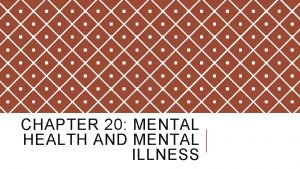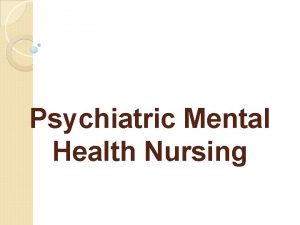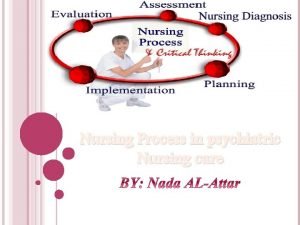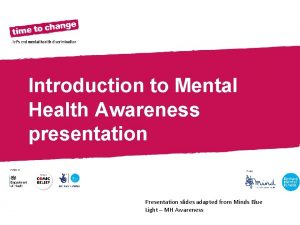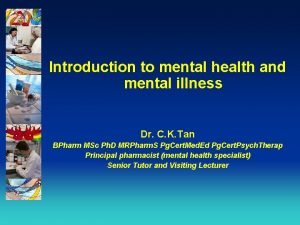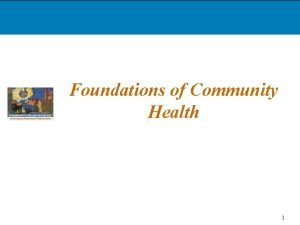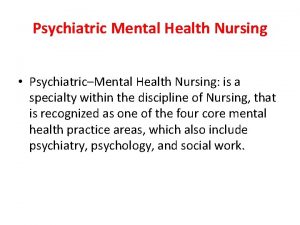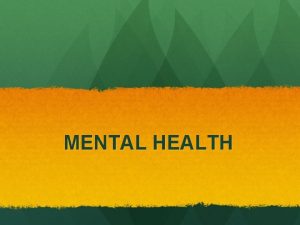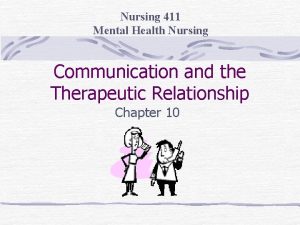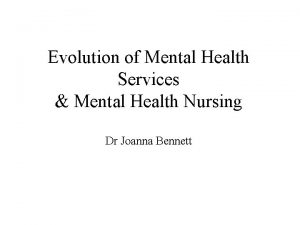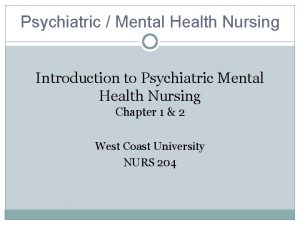Introduction to Mental Health Nursing MENTAL HEALTH AND








- Slides: 8

Introduction to Mental Health Nursing MENTAL HEALTH AND MENTAL ILLNESS Mental health and mental illness are difficult to define precisely. People who can carry out their roles in society and whose behavior is appropriate and adaptive are viewed as healthy. Conversely those who fail to fulfill roles and carry out responsibilities or whose behavior is inappropriate are viewed as ill. The culture of any society strongly influences its values and beliefs, and this in turn affects how that society defines health and illness. What one society may view as acceptable and appropriate, another society may see as maladaptive or inappropriate.

MENTAL HEALTH AND MENTAL ILLNESS . DIAGNOSTIC AND STATISTICAL MANUAL OF MENTAL DISORDERS (DSM-IV-TR) The Diagnostic and Statistical Manual of Mental Disorders-Text Revision (DSM-IV-TR), now in its fourth edition, is a taxonomy published by the APA. The DSM-IV-TR describes all mental disorders, outlining specific diagnostic criteria for each based on clinical experience and research. All mental health clinicians who diagnose psychiatric disorders use the DSM-IV-TR.

MENTAL HEALTH AND MENTAL ILLNESS . DIAGNOSTIC AND STATISTICAL MANUAL OF MENTAL DISORDERS (DSM-IV-TR) The DSM-IV-TR has three purposes: To provide a standardized and language for all mental health professionals • To present defining characteristics or symptoms that differentiate specific diagnoses • To assist in identifying the underlying causes of disorders

STANDARDS OF PSYCHIATRIC-MENTAL HEALTH CLINICAL NURSING PRACTICE STANDARDS OF CARE: Standard I. Assessment The psychiatric-mental health nurse collects client health data. Standard II. Diagnosis The psychiatric-mental health nurse analyzes the data in determining diagnoses. Standard III. Outcome Identification The psychiatric-mental health nurse identifies expected outcomes individualized to the client. Standard IV. Planning The psychiatric-mental health nurse develops a plan of care that prescribes interventions to attain expected outcomes. Standard V. Implementation The psychiatric-mental health nurse implements the interventions identified in the plan of care. Standard Va. Counseling The psychiatric-mental health nurse uses counseling interventions to assist clients in improving or regaining their previous coping abilities, fostering mental health, and preventing mental illness and disability. Standard Vb. Milieu Therapy The psychiatric-mental health nurse provides, structures, and maintains a therapeutic environment in collaboration with the client and other health care providers.

PSYCHIATRIC MENTAL HEALTH NURSING PHENOMENA OF CONCERN Actual or potential mental health problems pertaining to: • The maintenance of optimal health and well-being and the prevention of psychobiologic illness • Self-care limitations or impaired functioning related to mental and emotional distress • Deficits in the functioning of significant biologic, emotional, and cognitive symptoms • Emotional stress or crisis components of illness, pain, and disability • Self-concept changes, developmental issues, and life process changes • Problems related to emotions such as anxiety, anger, sadness, loneliness, and grief • Physical symptoms that occur along with altered psychological functioning • Alterations in thinking, perceiving, symbolizing, communicating, and decision-making • Difficulties relating to others • Behaviors and mental states that indicate the client is a danger to self or others or has a severe disability • Interpersonal, systemic, sococultural, spiritual, or environmental circumstances or events that affect the mental or emotional well-being of the individual, family, or community • Symptom management, side effects/toxicities associated with psychopharmacologic intervention, and other aspects of the treatment regimen

: PSYCHIATRIC NURSING PRACTICE In 1873, Linda Richards graduated from the New England Hospital for Women and Children in Boston. She went on to improve nursing care in psychiatric hospitals and organized educational programs in state mental hospitals in Illinois. Richards is called the first American psychiatric nurse; she believed that “the mentally sick should be at least as well cared for as the physically sick” (Doona, 1984). The first training of nurses to work with persons with mental illness was in 1882 at Mc. Lean Hospital in Waverly, Mass. The care was primarily custodial and focused on nutrition, hygiene, and activity.

AREAS OF PRACTICE BASIC-LEVEL FUNCTIONS • Counseling Interventions and communication techniques Problem solving Crisis intervention Stress management Behavior modification • Milieu therapy Maintain therapeutic environment Teach skills Encourage communication between clients and others Promote growth through role-modeling • Self-care activities Encourage independence Increase self-esteem Improve function and health • Psychobiologic interventions Administer medications Teaching Observations • Health teaching • Case management • Health promotion and maintenance ADVANCED-LEVEL FUNCTIONS • Psychotherapy • Prescriptive authority for drugs (in many states) • Consultation • Evaluation

Critical Thinking Questions 1. In your own words, describe mental health. Describe the characteristics, behavior, and abilities of someone who is mentally healthy. 2. When you think of mental illness, what images or ideas come to mind? Where do these ideas come from—movies, television, personal experience? . 3. What personal characteristics do you have that indicate good mental health?
